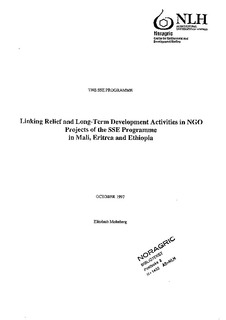Linking Relief and Long-Term Development Activities in NGO Projects of the SSE Programme in Mali, Eritrea and Ethiopoia
Report
Permanent lenke
http://hdl.handle.net/11250/2601728Utgivelsesdato
1997-10Metadata
Vis full innførselSamlinger
Sammendrag
Sustainability, including the minimisation of local dependency on future aid, is an SSE program principle. However, critics, notably the 1992 Cowiconsult evaluation of the SSE program, have pointed out that the frequent use of food distribution schemes like food aid and food-for-work is a serious constraint to achieving sustainable development in this respect. This mode of implementation has been termed "long term relief" rather than development, and critics have pointed to various problems resulting from this approach, such as dependency and production disincentives in target communities.
Such criticism has made NGOs wary of the use of food provisioning interventions. There is considerable concern over issues like how to deal with and avoid food distribution-induced dependency in areas with permanent food deficits, and whether the same institution should do relief and dependency. There is also a very real concem, in the field as well as in the board room, that development efforts will be undermined if additional or what is seen as contradictory responsibilities are to be taken on. However, as a consequence of this reluctance, NGOs may find themselves in an awkward position due to their not addressing very central and at times pressing problems of need. Particularly at times of increased stress and in situations of impending famine, this may result in the undermining of local good-will and NGOs' own development efforts alike
Beskrivelse
Fra NORAGRIC. The SSE Programme.

